Blockchain Testing Services: The Ultimate Guide for 2026
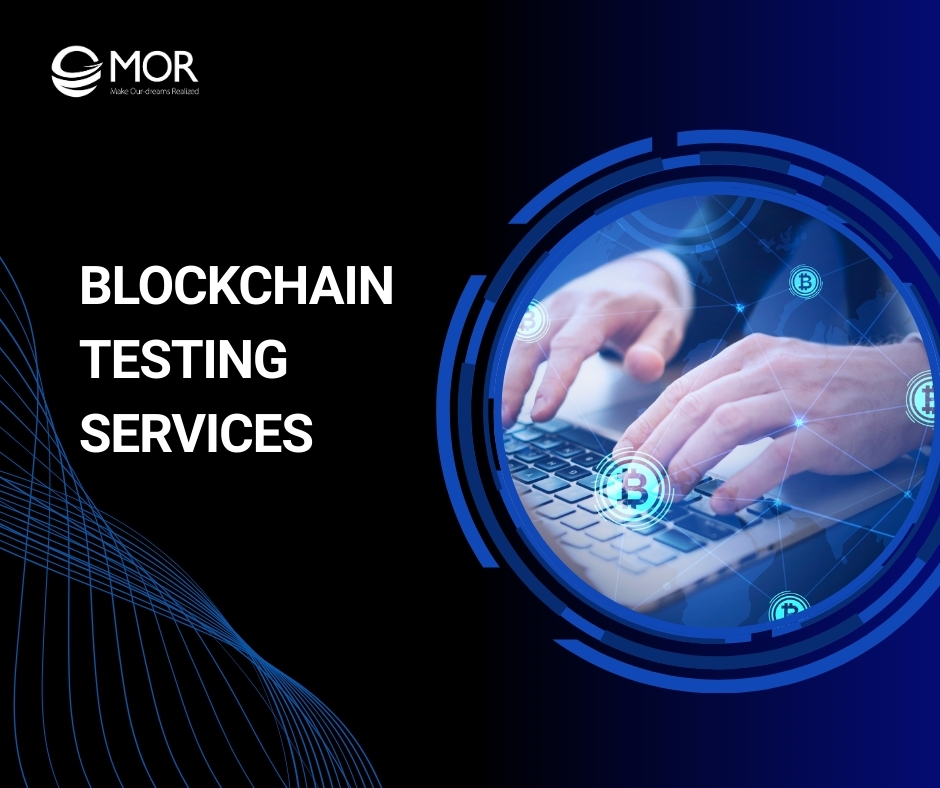
Adopting blockchain comes with challenges in reliability, scalability, and security that only expert blockchain testing services can address. Without proper validation, projects face costly risks and setbacks. This MOR Software’s guide explores testing essentials, best practices, and leading providers to help you build secure, future-ready blockchain systems.
What Are Blockchain Testing Services?
Blockchain testing services are designed to validate the performance, accuracy, and safety of blockchain systems before and after deployment. They ensure that every protocol functions as intended in development and continues to perform securely in production environments. This process safeguards data integrity and minimizes risks across distributed networks.
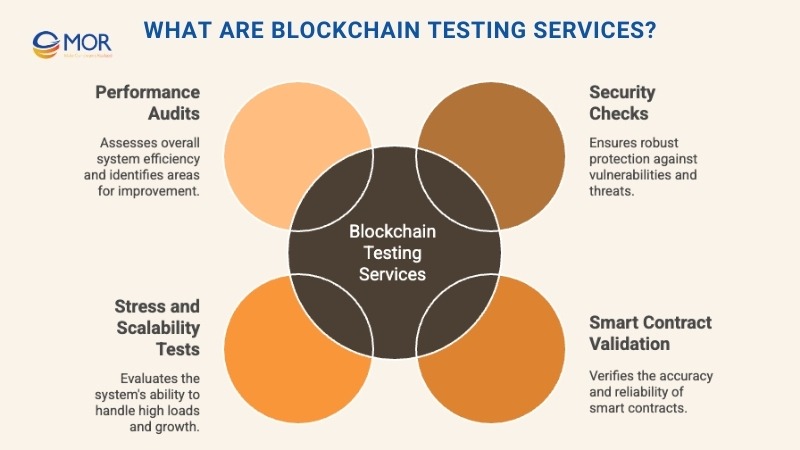
The financial stakes are clear, in Q1 2025 alone projects lost about $1.64 billion to hacks across the ecosystem.
A complete blockchain test strategy typically covers several layers. Security checks, smart contract validation, load and stress evaluations, scalability assessments, and network stability reviews are all standard.
In addition, performance audits, liquidity reviews, and peer-based examinations help confirm that the enterprise blockchain ecosystem can withstand real-world demands. Together, these practices create the foundation for any successful blockchain rollout.
Key Benefits Of Hiring Blockchain Testing Services
Blockchain solutions are transforming industries by making secure, traceable, and transparent transactions possible on a large scale. With this rapid adoption comes the urgent need for blockchain testing services that verify reliability at every stage.
If testing is overlooked, applications can fail under stress, become vulnerable to cyberattacks, or trigger financial and operational damage. IBM’s 2025 report puts the global average cost of a data breach at $4.44 million. This shows why prevention and hardening pay off.
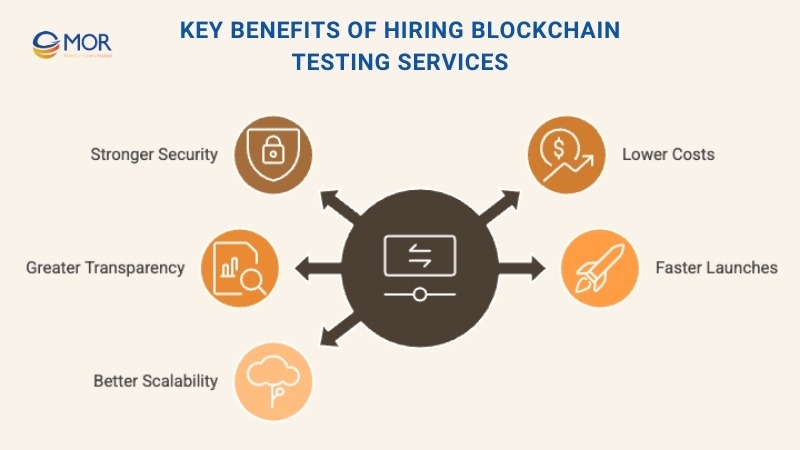
Stronger Security And Trust
Comprehensive blockchain application testing services validate both system integrity and user permissions. Security reviews confirm that transaction data stays confidential and that only approved participants can interact with the network.
Smart contract testing also ensures that code executes consistently without hidden flaws or discrepancies. Through mid 2025, attackers stole more than $2.17 billion from crypto services. This is a reminder that rigorous reviews and permission checks are not optional.
Lower Costs And Less Complexity
By addressing vulnerabilities and performance issues early, testing prevents expensive fixes after deployment. Quality assurance during development means applications can scale more easily, run smoothly at launch, and demand fewer resources for ongoing maintenance.
This proactive approach allows teams to act quickly on improvements while minimizing risks tied to errors or downtime. NIST has shown that fixing defects late in the contract lifecycle management software can cost roughly 10 to 30 times more than addressing them during design. So early testing avoids expensive rework.
Greater Transparency And Auditability
One of the most valuable outcomes of blockchain testing services is the higher level of transparency they provide. With advanced verification methods, every transaction within the chain can be authenticated and traced, giving participants clear visibility into how data is processed and stored.
This controlled detail strengthens trust and builds confidence among all parties involved. Beyond improving user assurance, the same capabilities also support compliance, since regulators require clear audit trails that prove system integrity. By making audibility straightforward, testing helps businesses maintain regulatory alignment without additional overhead.
Faster Product Launches
Speed matters in competitive markets, and blockchain innovators know that delays can result in missed opportunities. With blockchain QA testing, companies can spot coding issues early, fix them quickly, and move closer to a reliable release. This streamlined process means products can launch faster, at lower cost, and with fewer risks of costly failures after deployment.
Early testing also improves user adoption since stable applications are more likely to succeed in crowded markets. By accelerating delivery while ensuring quality, testing gives businesses the agility to position themselves ahead of competitors and capture market share quickly.
Better Scalability
For any organization planning to expand, scalability is a critical factor, and blockchain testing services help validate this capability from the start. Testing determines whether a blockchain application can adjust smoothly when demand rises or decreases, ensuring the platform remains stable under varying conditions.
This kind of automated testing for blockchain provides the assurance that systems will deliver consistent performance over time, even as user activity or transaction volume grows. With scalability validated through rigorous processes, businesses can invest in blockchain infrastructure knowing it has the flexibility and reliability to support long-term adoption.
>>> Let's break down the blockchain development companies in USA, trends, and insights that are most important in 2026.
Top 15 Blockchain Testing Services For 2026
We’ve gathered the leading providers of blockchain testing services for 2026. Each company brings its own expertise, tools, and approach to securing blockchain projects. Below, we highlight their strengths, specialized capabilities, and what sets them apart when it comes to ensuring reliability and trust.
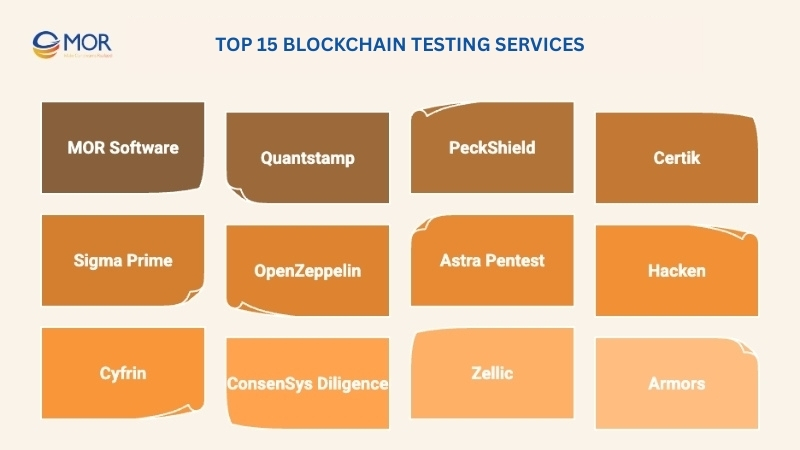
MOR Software
Established in 2016, MOR Software has grown into one of Vietnam’s most recognized software outsourcing providers, honored with awards like Sao Khue and appraised at CMMI Level 3. With offices in Vietnam and Japan, we work with clients worldwide and deliver projects across blockchain, fintech, healthcare, logistics, HRM, and retail.
As a blockchain testing company, we provide more than just development. Our services include end-to-end blockchain audits, smart contract verification, enterprise blockchain consulting and cross-chain validation. By combining ISO-certified processes with Agile methods, we help businesses improve security, maintain compliance, and scale blockchain ecosystems confidently.
Key Features
Comprehensive Blockchain Audits
Thorough assessments of blockchain protocols, consensus mechanisms, and cryptography to eliminate potential vulnerabilities.
Smart Contract Testing
Detailed manual and automated reviews of smart contracts to detect bugs, prevent exploits, and ensure safe deployment.
Security & Penetration Testing
Simulated attack scenarios to expose weaknesses in blockchain networks, APIs, and connected systems.
Cross-Chain and Integration Testing
Validation of interoperability for smooth and secure asset transfers across multiple ecosystems.
Compliance Support
Audit-readiness for highly regulated industries, aligned with ISO 9001 and ISO 27001 standards.
Custom Development & Consulting
Tailored blockchain solutions ranging from decentralized apps to enterprise integrations, built with continuous client feedback.
Pros
- Over 850 successful global projects.
- Winner of prestigious ICT awards in Vietnam and Asia.
- Broad expertise spanning blockchain, AI automation services, cloud, and Salesforce.
- Certified engineers with domain-specific knowledge.
- Flexible outsourcing and dedicated team engagement models.
Cons
- High project demand may cause onboarding delays.
Why MOR Software Stands Out
MOR Software JSC distinguishes itself by combining scale, certified quality, and technical expertise. Our blockchain testing services support everything from DeFi audits and NFT security to enterprise-grade blockchain integration. With proven delivery experience and a global presence, we are a trusted partner for businesses that demand secure, scalable, and future-ready blockchain solutions.
Quantstamp
Founded in 2017, Quantstamp has become a recognized leader in blockchain security with a strong emphasis on Ethereum and decentralized finance ecosystems. The company is widely known for its smart contract audits, aiming to boost the reliability and resilience of blockchain networks. By blending automation with manual reviews, Quantstamp provides thorough blockchain testing services that help uncover vulnerabilities before they cause damage.
Key Features
Comprehensive Auditing
Smart contract assessments carried out through both automated scans and hands-on reviews.
Automated Vulnerability Detection
Proprietary tools designed to flag weaknesses across blockchain applications and DeFi platforms.
Skilled Audit Team
A seasoned group of engineers and blockchain testers with proven expertise in security audits.
Strong DeFi Focus
Extensive experience in auditing decentralized finance projects, making them a go-to partner for DeFi teams.
Pros
- Known for reliable automated audits.
- Deep Ethereum and DeFi knowledge.
- Provides detailed and actionable reports.
- Active in advancing blockchain security research.
Cons
- Pricing models can be unpredictable for some clients.
Why Quantstamp Stands Out
Quantstamp sets itself apart by combining advanced automation with continuous post-deployment monitoring. This dual approach gives projects lasting protection, not just one-time reviews. For organizations building in fast-moving blockchain markets, their ability to provide both speed and depth makes Quantstamp a dependable choice for long-term security.
PeckShield
Founded in 2018, PeckShield has built a strong reputation as a security-focused firm specializing in smart contract audit and decentralized finance protection. Their work centers on Ethereum and Binance Smart Chain projects, where they deliver blockchain testing services designed to safeguard dApps and smart contracts against evolving risks. Over the years, PeckShield has become known for delivering precise assessments that help organizations maintain trust and reliability in their blockchain systems.
Key Features
Thorough Smart Contract Audits
Comprehensive reviews using both automated scans and manual inspections to uncover flaws in contract logic.
Real-Time Threat Monitoring
A signature strength of PeckShield is its ability to provide live vulnerability tracking, enabling clients to react quickly to new threats.
Ethereum and BSC Expertise
In-depth knowledge of Ethereum and Binance Smart Chain ecosystems, providing tailored audits and testing.
Use of Advanced Blockchain Tools
Employs cutting-edge blockchain tools for vulnerability detection and detailed risk analysis.
Pros
- Recognized expertise in blockchain security.
- Strong capabilities in scanning and identifying vulnerabilities.
- Collaborative approach with clients for customized solutions.
- Active participant in blockchain research communities.
Cons
- Support for non-Ethereum or non-BSC projects is more limited.
Why PeckShield Stands Out
PeckShield differentiates itself by combining real-time monitoring with proactive auditing practices. Their ability to anticipate and neutralize threats before they escalate makes them a valuable partner for blockchain enterprises. By integrating advanced technology with specialized expertise, PeckShield ensures projects remain both secure and resilient in competitive markets.
Certik
Founded in 2017, Certik has become one of the most recognized names in blockchain security, offering innovative approaches to auditing and verification. The company is best known for applying formal verification techniques, using mathematical proofs to confirm the integrity of smart contracts and blockchain systems. By delivering rigorous blockchain testing services, Certik helps organizations minimize vulnerabilities and build trust across multiple blockchain ecosystems. Their reputation for precision and reliability has made them a preferred blockchain testing service provider for projects worldwide.
Key Features
Formal Verification Methods
Applies mathematical proof techniques to validate the correctness and security of smart contracts.
Cross-Chain Coverage
Conducts audits across diverse blockchain platforms, ensuring comprehensive assessments for multi-chain projects.
Smart Contract Security
Provides in-depth testing and reviews to prevent contract exploits and reduce risks.
Multi-Platform Adaptability
Supports projects across numerous blockchain ecosystems, showing versatility and scalability.
Mathematical Assurance
Delivers a high level of confidence through mathematically verified results.
Pros
- Deep specialization in blockchain and smart contract security.
- Combines automated tools with expert manual audits.
- Provides tailored strategies for each project.
- Contributes actively to security research and development.
Cons
- Pricing tends to be higher than many other providers.
Why Certik Stands Out
Certik distinguishes itself with its pioneering use of formal verification, applying mathematical models to validate code and uncover flaws. This advanced methodology goes beyond standard audits, offering unmatched precision and confidence in security outcomes. By blending formal verification with comprehensive blockchain testing services, Certik positions itself as a leader in safeguarding smart contracts and blockchain ecosystems.
Sigma Prime
Sigma Prime is a leading name in blockchain security, widely recognized for its deep specialization in Ethereum and Beacon Chain ecosystems. The company focuses heavily on strengthening Ethereum-based projects, ensuring that critical infrastructure remains secure and reliable. Through tailored blockchain testing services, Sigma Prime delivers audits, penetration tests, and consulting that help safeguard projects built on next-generation blockchain networks.
Key Features
Ethereum and Beacon Chain Knowledge
Extensive expertise in Ethereum and Beacon Chain technologies, positioning them as a trusted partner for projects in these environments.
Contributions to Security Research
Active involvement in blockchain security research, constantly monitoring and responding to new vulnerabilities.
Comprehensive Security Offerings
Provides smart contract automation reviews, penetration testing, and advisory services for complete coverage.
Secure Coding Practices
Collaborates closely with developers to implement secure coding, minimizing the risks exposed during any blockchain test.
Beacon Chain Specialization
A strong emphasis on Beacon Chain audits for Ethereum projects, strengthening Eth2 security.
Pros
- Highly specialized in Ethereum and Beacon Chain.
- Strong involvement in advancing blockchain research.
- Broad range of audit and security services.
- Promotes best practices in secure coding.
Cons
- High demand may cause longer waiting times for services.
Why Sigma Prime Stands Out
Sigma Prime is distinguished by its role in Ethereum 2.0 development and its leadership in securing Beacon Chain projects. Their work on the Lighthouse client and their focus on scalability and security challenges make them a trusted partner in ensuring the future of blockchain platforms is both stable and secure.
OpenZeppelin
OpenZeppelin has established itself as a trusted name in blockchain security, dedicated to improving the resilience of smart contracts and decentralized applications. Known for providing a full suite of blockchain testing services, the company delivers audits, security frameworks, and open-source tools that help organizations build and deploy safer blockchain applications. Their commitment to community-driven development and continuous innovation has made OpenZeppelin a cornerstone in the blockchain security space.
Key Features
Pre-Audited Contract Library
Offers a robust library of open-source, reusable contracts that save time while encouraging secure development practices.
Smart Contract Audits and Penetration Testing
Conducts thorough manual and automated reviews to uncover vulnerabilities, backed by remediation guidance.
Security-Focused Consulting
Provides advisory services to help teams adopt best practices and integrate security throughout their workflows.
Community and Education
Runs workshops, publishes detailed guides, and shares resources to help developers and blockchain testers strengthen security knowledge.
Collaboration with Researchers
Welcomes input from the wider security community, continually improving tools and audit methodologies.
Pros
- Comprehensive security and testing solutions.
- Active role in blockchain security research.
- Works across various blockchain ecosystems.
- Strong focus on reusable, secure coding standards.
Cons
- High demand can cause longer wait times for audits.
Why OpenZeppelin Stands Out
OpenZeppelin stands apart for its industry-standard libraries and its proactive role in shaping secure blockchain development. By combining open-source contributions with advanced blockchain testing services, the company empowers developers to build applications with confidence and long-term reliability.
Astra Pentest
Founded in 2018, Astra Pentest has built its reputation on delivering top-tier audits and penetration testing for blockchain projects. The company combines manual code reviews with advanced automated tools to detect vulnerabilities across smart contracts and decentralized systems. By offering tailored blockchain testing services, Astra Pentest ensures projects are safeguarded against both common and complex security risks.
Key Features
Detailed Manual Code Review
Engages experienced auditors to perform deep manual inspections, catching vulnerabilities that tools alone might miss.
Automated Scanning Tools
Employs state-of-the-art static and dynamic analysis to strengthen results and identify hidden flaws.
Global Expert Network
Leverages a worldwide pool of security specialists, delivering diverse perspectives and broad expertise.
Custom Audit Plans
Designs tailored blockchain application testing services based on each project’s architecture, risk level, and requirements.
Pros
- Strong penetration testing capabilities.
- Emphasis on educating clients about security.
- Provides highly customized solutions.
Cons
- Services remain focused primarily on security assessments.
Why Astra Pentest Stands Out
Astra Pentest is known for its specialized penetration testing approach, focusing heavily on uncovering vulnerabilities unique to blockchain applications and infrastructure. Their ability to deliver project-specific, comprehensive blockchain testing services positions them as a trusted security partner for teams seeking more than generic assessments.
Hacken
Since 2017, Hacken has emerged as a leading name in blockchain security, offering end-to-end solutions for safeguarding decentralized ecosystems. Their services range from smart contract audits and penetration testing to bug bounty programs and incident response. Known for their proactive stance, Hacken delivers blockchain testing services that help projects stay secure against fast-evolving cyber threats.
Key Features
Comprehensive Security Coverage
Provides a wide scope of blockchain testing and security services, addressing the needs of projects of all sizes.
Bug Bounty Initiatives
Runs active bug bounty programs that tap into the expertise of the global security community to identify vulnerabilities.
Threat Intelligence Focus
Continuously monitors blockchain networks for new risks, helping clients respond before issues escalate.
Training and Education
Offers training modules and resources to help developers and end-users adopt stronger security practices.
Global Expertise
Backed by a diverse team of specialists with experience across multiple blockchain as a service platforms worldwide.
Pros
- Extensive suite of blockchain-focused security services.
- Strong engagement with the global blockchain community.
- Proven capabilities in penetration testing.
Cons
- Cost details available only through direct inquiries.
- Services may be expensive for smaller projects.
Why Hacken Stands Out
Hacken distinguishes itself by delivering security solutions tailored specifically to the blockchain sector. Their holistic model covers everything from smart contract audits to ecosystem-wide protection, ensuring clients benefit from well-rounded and proactive blockchain testing services.
Cyfrin
Cyfrin is a security-focused company specializing in smart contract audits and blockchain assessments. With a mission to strengthen decentralized systems, they provide tailored blockchain testing services designed to uncover vulnerabilities and improve overall reliability. By combining technical expertise with a collaborative approach, Cyfrin ensures projects meet the highest standards of security before launch.
Key Features
Data-Driven Vulnerability Detection
Applies AI and machine learning development services and advanced analytics to predict risks and identify weak points before they cause problems.
Developer-Centric Approach
Engages directly with teams to promote secure coding practices and provides practical tools for safer smart contract development.
Open-Source Contributions
Regularly shares research and tools with the blockchain community, reinforcing industry-wide security standards.
Multi-Platform Expertise
Supports diverse ecosystems, including Ethereum, Solana, and Cosmos, with audits adapted to each platform.
Clear and Accessible Reporting
Delivers audit results in formats that are easily understood by technical and non-technical stakeholders alike.
Pros
- Skilled across widely used blockchains.
- Provides cost-effective solutions.
- Proactive in addressing security issues.
- Strong emphasis on developer education.
Cons
- Limited coverage for less common platforms.
- Fewer public details on completed audits.
Why Cyfrin Stands Out
Cyfrin is recognized for its focus on decentralized finance and its ability to deliver reliable blockchain testing service packages tailored to DeFi-specific risks. Their proactive, education-driven approach and expertise across major ecosystems make them a trusted partner for projects seeking secure and scalable growth.
ConsenSys Diligence
As part of ConsenSys, ConsenSys Diligence focuses on improving the security and reliability of decentralized applications. With years of experience in Ethereum and DeFi ecosystems, the team delivers comprehensive blockchain testing services that help projects strengthen integrity and resilience. Their strong connection to ConsenSys gives them unmatched insight into Ethereum technology and its practical applications.
Key Features
Ethereum Expertise
Leverages deep knowledge of Ethereum and related technologies to provide highly targeted audits.
Thorough Auditing Process
Combines manual reviews, penetration testing, and automated tools to identify vulnerabilities effectively.
Tailored Audit Strategies
Designs audit plans around each project’s specific architecture and risk profile for focused security validation.
Integration with ConsenSys Ecosystem
Gives clients access to broader resources, including development and infrastructure software for blockchain solutions.
Pros
- Strong Ethereum and DeFi specialization.
- Active contributor to blockchain research.
- Collaborates with teams to promote secure coding.
Cons
- Higher pricing compared to some competitors.
- Service availability may be limited due to high demand.
Why ConsenSys Diligence Stands Out
ConsenSys Diligence is recognized for combining extensive Ethereum expertise with a structured, research-driven approach to security. Their ability to integrate audits with broader ConsenSys services ensures clients receive not just testing but a complete blockchain support ecosystem, making them one of the most trusted providers of blockchain testing services.
Zellic
Zellic has established itself as a trusted name in blockchain security, recognized for its thorough audits and collaborative approach. Dedicated to smart contract evaluations and system-wide security reviews, the company provides blockchain testing services that help projects address vulnerabilities early and strengthen resilience. By working closely with developers, Zellic ensures security is not just a final step but a practice embedded throughout the development lifecycle.
Key Features
Smart Contract Assessments
Performs in-depth audits to detect risks in smart contract platforms and blockchain platforms.
Tailored Security Approaches
Designs strategies specific to each project’s needs, reflecting the unique risks of different ecosystems.
Skilled Security Professionals
Employs a team of experienced blockchain testers and security experts to deliver reliable audits.
Proactive Risk Management
Partners with blockchain developers to adopt secure coding habits and integrate safety measures early.
Focus on Education
Provides training and awareness to help teams understand best practices and stay ahead of emerging threats.
Pros
- Strong expertise in smart contract security.
- Staffed with experienced blockchain security professionals.
- Actively reduces risks through early detection.
- Customizes strategies to client requirements.
- Offers educational guidance alongside audits.
Cons
- Audit availability can vary with demand.
- Coverage may be narrower for less common blockchain platforms.
Why Zellic Stands Out
Zellic sets itself apart with its detailed smart contract reviews and hands-on security consulting. By aligning with the latest blockchain innovations, they provide forward-looking blockchain testing services that address both current and emerging threats. Their commitment to precision and excellence makes them a standout partner for projects seeking long-term security and trust.
Armors
Established in 2018, Armors is a consulting firm focused on Web3 and blockchain security. The company provides a wide range of blockchain testing services, including audits, penetration testing, and incident response. By addressing risks in decentralized applications and blockchain infrastructures, Armors helps organizations strengthen security and maintain trust in their platforms.
Key Features
End-to-End Security Coverage
Goes beyond smart contract reviews to deliver ecosystem-wide assessments, protecting every layer of the blockchain stack.
Realistic Attack Simulations
Uses penetration testing that mimics real-world attacker behavior, exposing weaknesses often missed by standard methods.
Incident Response Capability
A dedicated team of specialists assists clients during breaches, limiting damage and supporting recovery.
Training and Awareness
Provides programs to educate teams on cyber risks, equipping developers and blockchain testers with practical best practices.
Diverse Global Team
Brings together professionals with varied industry backgrounds, serving clients across multiple regions.
Pros
- Strong expertise in smart contract auditing.
- Custom-tailored security services.
- Proactive approach to risk management.
- Flexible solutions for projects of different scales.
- Comprehensive evaluations across blockchain layers.
Cons
- Pricing details may not be easily accessible.
- Limited public information on past projects and case studies.
Why Armors Stands Out
Armors distinguishes itself by combining broad-spectrum assessments with a strong focus on emerging blockchain threats. Their dedication to proactive security and continuous improvement makes them a trusted provider of blockchain testing services for organizations seeking long-term protection.
Hashlock
Hashlock is recognized as Australia’s leading independent blockchain security and auditing firm. Their focus on manual reviews and close collaboration with clients has positioned them as a trusted provider of blockchain testing services. By emphasizing practical vulnerability detection and tailored recommendations, Hashlock ensures audits deliver real value and lasting protection for complex projects.
Key Features
In-Depth Manual Code Review
Relies on experienced auditors to thoroughly examine code, particularly beneficial for sophisticated smart contracts.
Client-Centered Collaboration
Engages clients throughout the process, aligning results with each project’s specific risks and goals.
Transparent Reporting
Produces clear and detailed audit reports that explain vulnerabilities and outline remediation steps.
Multi-Platform Expertise
Provides audits and blockchain testing service offerings across Ethereum, Solana, Binance Smart Chain, and Polkadot.
Pros
- Strong focus on smart contract security.
- Ensures blockchain protocols are rigorously tested.
- Highly collaborative with clients.
- Promotes awareness of security best practices.
- Supplies detailed and actionable reports.
Cons
- Pricing details typically require direct contact.
Why Hashlock Stands Out
Hashlock differentiates itself by combining manual auditing with advanced cryptographic methods, including time-locking techniques for smart contracts. Their approach not only strengthens security but also enhances functionality, making them one of the most innovative providers of blockchain testing services in the industry.
Slowmist
Slowmist is one of China’s most recognized names in blockchain security, delivering end-to-end blockchain testing services for smart contracts, blockchain protocols, and infrastructure. By combining detailed audits with real-time monitoring and incident response, this blockchain testing company supports a global client base while maintaining a strong presence in Asia. Their holistic approach makes them a preferred partner for organizations seeking both immediate protection and long-term resilience.
Key Features
All-in-One Security Solutions
Provides a full suite of services, including audits, penetration testing, incident response, and threat intelligence.
Real-Time Monitoring and Bug Bounty Programs
Operates live monitoring systems to flag suspicious activity while incentivizing the wider community through active bug bounties.
Proactive Threat Research
Specializes in tracking emerging risks and mitigating zero-day vulnerabilities before they escalate.
Deep Market Knowledge
Brings unique insights into the Asian blockchain sector, informed by years of regional expertise.
Commitment to Education
Promotes industry-wide awareness with research publications, resources, and contributions to global events.
Pros
- Offers thorough smart contract audits.
- Provides ecosystem-wide blockchain security solutions.
- Staffed with seasoned blockchain security experts.
- Adapts services to project-specific requirements.
- Actively contributes research and guidance to the community.
Cons
- Service availability can fluctuate based on demand.
- Broader support for some blockchain platforms may be limited.
Why Slowmist Stands Out
Slowmist is recognized for its ability to secure every layer of the blockchain environment, from smart contracts to large-scale infrastructure. By combining continuous monitoring with targeted blockchain testing services, they deliver a level of security that extends beyond code audits, positioning them as a trusted authority in global blockchain security.
Types Of Blockchain Testing Services Every Business Should Know
Building reliable blockchain systems requires testing across multiple layers, each designed to answer different questions. Every category of blockchain testing services reveals where failures may occur, what needs stronger protection, and how applications behave under uncertain or hostile conditions. These categories represent distinct approaches, with each type focusing on a specific dimension of risk, system behavior, or failure response.
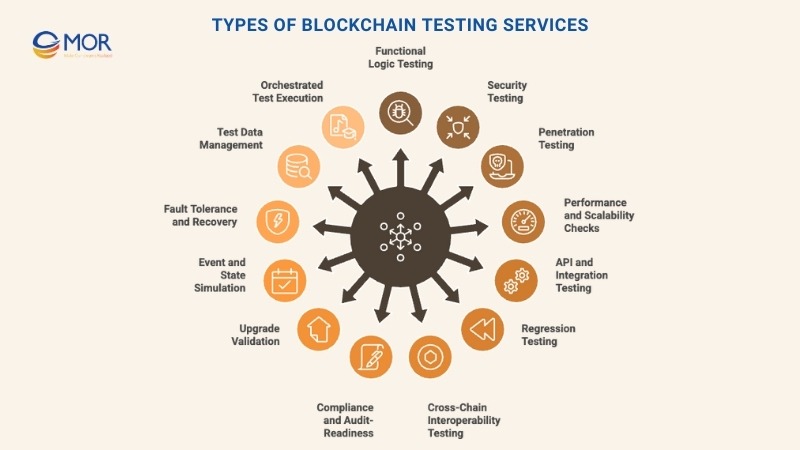
Functional Logic Testing
This type of blockchain test validates the expected behavior of smart contracts and application logic. It involves checking conditionals, verifying inputs and outputs, and ensuring functions execute as intended under both normal and edge cases.
Through confirming that rules are consistently enforced and unintended execution paths are blocked, functional testing safeguards the reliability of blockchain applications.
Security Testing
Security testing targets weaknesses that could compromise trust in blockchain ecosystems. It includes fuzzing techniques, access control verification, simulations of logic abuse, and reviews of third-party dependencies. This step is especially vital for projects involving financial transactions or governance features, where protecting sensitive data throughout the transaction lifecycle is critical.
Penetration Testing
Penetration testing replicates real-world attacker behavior to evaluate how blockchain systems respond under pressure. This involves injecting malicious inputs, applying stress to authentication layers, and probing smart contracts or network nodes for exploitable flaws.
By incorporating penetration testing into development pipelines, businesses can detect and fix vulnerabilities early. As part of comprehensive blockchain testing services, this approach reduces the risk of critical breaches before malicious actors strike.
Performance And Scalability Checks
Performance assessments measure how well blockchain app development operate under heavy load or limited resources. These tests track response time, throughput, block propagation delays, and node synchronization efficiency.
Scalability is validated through simulations of peak demand, high concurrency, and sustained transaction flows. With automated testing for blockchain, teams can quickly model real-world conditions, ensuring platforms remain stable and responsive as usage grows.
API And Integration Testing
API and integration testing ensures proper communication between the blockchain layer and connected systems. This process often focuses on oracles, identity providers, external APIs, and off-chain services.
Key checks include verifying data accuracy, managing errors, and monitoring timeout behaviors across distributed components. As part of blockchain testing services, it helps guarantee seamless interoperability between blockchain platforms and external applications.
Regression Testing
Regression testing validates that recent updates, patches, or bug fixes don’t create new issues. Teams rerun previously approved test cases and compare outcomes across builds to confirm stability.
In blockchain systems, even small adjustments to contracts can affect state management or event execution. With structured blockchain QA testing, teams can preserve functionality across releases while maintaining user trust.
Cross-Chain Interoperability Testing
Cross-chain testing verifies that different blockchain networks can share data reliably, follow established protocols, and recover properly from inconsistencies.
This is essential in ecosystems that rely on bridges, wrapped tokens, or multichain governance. As part of professional blockchain testing services, it ensures seamless interaction across platforms.
Compliance And Audit-Readiness
Compliance testing evaluates how systems adhere to regulations and operational standards. It includes validating transaction records, supporting reproducibility, and simulating audit processes where traceability is critical.
With tailored blockchain application testing services, organizations can prepare for regulatory reviews with confidence.
Upgrade Validation
Upgrade testing assesses how smoothly contracts or protocols shift from one version to another. It involves simulating staged rollouts, handling mismatched node versions, and migrating persistent data without losing consistency or causing consensus errors.
Event And State Simulation
Event and state simulation analyzes how blockchain systems react to event sequences, complex transitions, and asynchronous processes. This approach is particularly valuable for workflows involving timeouts, chain reactions, or automated smart contract execution.
Fault Tolerance And Recovery
This type of testing evaluates how blockchain systems respond when nodes go offline, transactions fail midway, or components become unavailable.
It is particularly important in automated setups where little human oversight exists, requiring recovery to be handled through protocol logic. As part of structured blockchain testing services, fault tolerance ensures reliability even under unexpected disruptions.
Test Data Management
Reliable automation depends on high-quality, reusable datasets. Test data management focuses on how datasets are created, injected, and reset within blockchain environments, especially when working with immutable storage or limited rollback options.
Skilled blockchain testers design these processes to maintain accuracy while avoiding conflicts during repeated test cycles.
Orchestrated Test Execution
Coordinating automated tests across distributed blockchain layers requires careful orchestration. This involves defining when tests run, how environments are provisioned, and how results are consolidated.
Teams can maintain consistent oversight of performance and stability by organizing test execution in fragmented or evolving systems.
Key Factors When Selecting A Blockchain Testing Services Partner
Selecting the right partner for blockchain testing services is critical to safeguarding the integrity and performance of your blockchain initiatives. Below are some of the most important considerations when evaluating a provider.
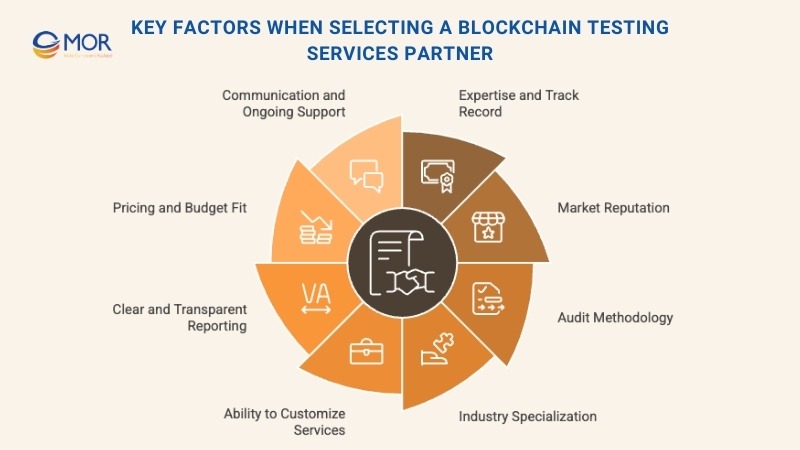
Expertise And Track Record
Examine the provider’s background and proven results as a blockchain testing company. Consider how many projects they have handled, the complexity of those engagements, and their experience across multiple blockchain platforms. A partner with a solid history and skilled testers is far more likely to deliver accurate and dependable results.
Market Reputation
Investigate how the company is regarded in the industry. Reviews, case studies, and client testimonials provide useful insight into reliability and service quality. A positive reputation is often a strong sign of credibility and professional competence.
Audit Methodology
It’s important to understand how a provider delivers its blockchain testing services. Review whether their process follows industry-recognized security standards and proven practices. A structured and methodical approach ensures vulnerabilities are identified thoroughly, reducing risks and reinforcing the security of your blockchain project.
Industry Specialization
Evaluate if the provider has experience in your sector, as different industries carry unique compliance needs and risk factors. A partner with domain-specific expertise can deliver blockchain application testing services that address specialized vulnerabilities, offering stronger protection tailored to your business environment.
Ability To Customize Services
Every blockchain initiative has its own goals and risks, so the ability to tailor blockchain testing services is essential. A provider that adapts its approach to the specific requirements of your project demonstrates flexibility and a stronger commitment to delivering relevant results.
Clear And Transparent Reporting
Review the provider’s sample reports to judge their clarity, detail, and usefulness. Strong documentation should outline vulnerabilities, their severity, and recommended fixes in plain language. With thorough blockchain QA testing and transparent reporting, you gain a clear roadmap for addressing security issues effectively.
Pricing And Budget Fit
Request clear pricing details and understand how the provider structures its fees for blockchain testing services. Make sure the costs align with your budget while still delivering the quality your project requires. The right partner will balance affordability with reliable service, avoiding hidden expenses that could disrupt your planning.
Communication And Ongoing Support
Strong communication is critical during any blockchain testing engagement. Evaluate how quickly the provider responds and the channels they use to keep you updated. Also, check what kind of post-audit support is available, since continued assistance can be valuable for resolving issues that surface after the initial review.
Conclusion
Adopting blockchain brings both opportunities and challenges, making reliable blockchain testing services essential for long-term success. From smart contract audits to cross-chain validation, thorough testing safeguards performance, compliance, and security across every layer of your system. As businesses scale, partnering with an experienced provider ensures confidence and resilience in fast-changing markets. This guide by MOR Software is your starting point.
Contact us today to explore how we can strengthen your blockchain projects.
MOR SOFTWARE
Frequently Asked Questions (FAQs)
What is blockchain testing?
Blockchain testing is the process of verifying smart contracts, consensus mechanisms, APIs, and the overall network to ensure secure, reliable, and accurate performance under different conditions.
Why is blockchain testing important?
It helps identify vulnerabilities, improves security, ensures compliance, and guarantees that decentralized applications (dApps) or blockchain systems behave as expected in real-world scenarios.
What types of blockchain testing are most common?
Key types include functional testing, smart contract auditing, performance and scalability testing, penetration testing, integration testing, regression testing, and compliance validation.
How is blockchain testing different from traditional software testing?
Unlike traditional systems, blockchain testing involves immutable data, distributed nodes, consensus algorithms, and cryptographic rules. This requires specialized tools and methods to validate transaction integrity, state changes, and security.
Which tools are used in blockchain testing?
Popular tools include Truffle, Ganache, Hardhat, Hyperledger Caliper, and MythX. These support smart contract validation, load testing, and vulnerability detection.
Can blockchain testing be automated?
Yes. Many parts of blockchain testing, like regression, load testing, and smart contract auditing, can be automated with frameworks. However, manual audits are still crucial for logic verification and complex vulnerabilities.
How long does a blockchain audit or testing cycle take?
The duration depends on project complexity. Smaller projects may take 2–3 weeks, while enterprise-grade blockchains or DeFi protocols often require 6–8 weeks or longer.
What industries benefit most from blockchain testing?
Industries such as finance, supply chain, healthcare, real estate, and retail rely heavily on blockchain testing to ensure compliance, secure transactions, and trustworthy data management.
Rate this article
0
over 5.0 based on 0 reviews
Your rating on this news:
Name
*Email
*Write your comment
*Send your comment
1